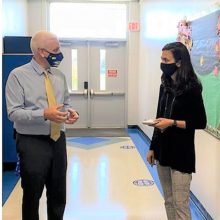

EdNC conducted a statewide survey about school performance grades from Sept. 22 to Oct. 10, 2022, in partnership with the N.C. Department of Public Instruction. EdNC retains editorial control over all surveys, and this survey included questions that EdNC first used in a survey in 2019 for comparability.
The survey was available on EdNC.org. It was intended for all education stakeholders in North Carolina, and 26,262 individuals participated. The survey was distributed via EdNC’s website, DPI’s website, social media, and a variety of other stakeholders and platforms.
Of those 26,262 total participants, the number of individuals who responded to each question varied as no question was required. When asked to select what role or industry is most relevant to their responses, 21,168 respondents answered, and here is how their roles broke down:
- 42% K-12 teacher
- 32% Parent/guardian/grandparent
- 8% K-12 School leader/principal
- 6% Student
- 4% K-12 District Leader
- 4% Other
- 1% University/college faculty/staff
- 1% Business/industry
- 1% State/local government
- 1% Nonprofit
- 72 of 115 Superintendents
Participants were also asked for their zip code to assess geographic representation. Below is a map of those zip codes, with non-North Carolina zip codes excluded.
The survey did not collect any other identifying information about participants to ensure responses could not be linked to individual people, particularly in small populations.
DPI’s analysis of the survey, which will be released later this week, focuses on the 19,160 participants who answered at least one substantive question.
What did they say?
First, respondents answered a series of statements that were also included in our 2019 People’s Session survey (which had a much smaller sample size of less than 1,000 respondents). There were nine statements provided in the 2022 survey, 18,626 total respondents, and response options included agree, disagree, and unsure. The breakdown of responses closely mirrors the results from 2019.
Participants most agree that school performance grades should include measures beyond test scores and student growth (90%), which was the same in 2019. However, participants were more divided when asked if schools should be publicly graded on their performance so that parents, community members, and policy makers can compare them (52% agree), which was the same in 2019. You can see the full breakdown of responses below. Hover over each cell to see the raw number of responses and participants for each statement.
Next, participants were asked to weigh in on a list of items that could be used to measure school quality in addition to student test scores, and 16,902 people responded. The items with the highest level of agreement that they should be used to measure school quality were:
- 82% – School safety (i.e. incidents of school crime, violence, school resource officer)
- 81% – School climate (overall social and learning climate)
- 81% – High school graduation rate
- 81% – Courses offered outside of core academics (i.e. arts, world languages, career and technical education)
- 78% – School environment/cleanliness
You can see the full breakdown of responses below. Hover over each cell to see the raw number of responses and participants for each statement.
The survey ended with a final question asking for additional ideas about what should be considered when redesigning school performance grades, and participants left 5,172 comments. The survey encouraged but did not require a 20-word limit, and the only comments excluded from public view used profanity.
You can view the full results of the survey here.
These results offer a brief, informal snapshot on opinions related to school performance grades and comments may include unverified, self-reported information.
Reach NC Voices
EdNC built Reach NC Voices, our surveying and engagement platform, because we believe North Carolina’s policy outcomes will be better and the education community will be stronger if more people’s voices are heard.
We created Reach to support listening, learning, and engaging.
In the past, EdNC has partnered with DPI, myFutureNC, the Institute of Emerging Issues, and other education organizations to deploy Reach surveys, hold listening sessions in community, and engage with those attending live events. Reach offers 16 different question types and texting as well as email interfaces. Reach is used by other media outlets across the country, including Outlier Media in Detroit, Resolve Philly, and KPCC in Los Angeles.



